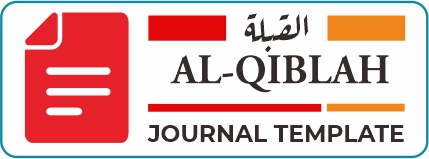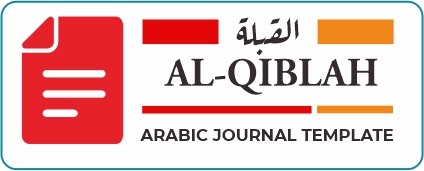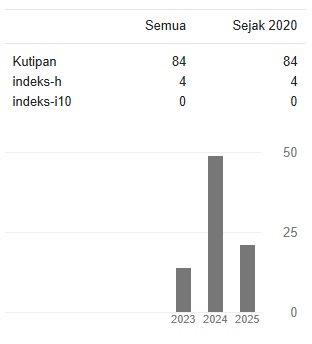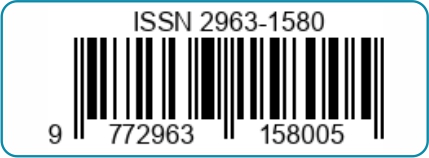Analisis Ayat Al-Qur'an tentang Kemiskinan: Kajian Tafsir Tematik Q.S. al-Żāriyāt Ayat 19
The Analysis of Quranic Verses on Poverty: A Thematic Tafsir Study of Surah al-Żāriyāt Verse 19
DOI:
https://doi.org/10.36701/qiblah.v4i2.2069Keywords:
Analysis, The Qur'an, Poverty, Thematic Exegesis, Q.S. al-Żāriyāt: 19Abstract
This study aims to find out how Q.S. al-Żāriyāt verse 19 describes the condition of poverty in the perspective of Islam, to find out what the relationship is between this verse and the principles of welfare in the perspective of thematic interpretation, and to find out how Islam's solution to poverty is reflected in Q.S. al-Żāriyāt verse 19. This research is a library research. The results of this study are that Q.S. al-Żāriyāt verse 19 describes poverty in Islam as a condition that not only involves material deficiencies, but is also related to social, moral, and spiritual aspects. In the thematic interpretation of Q.S. al-Żāriyāt verse 19, the principles of welfare in Islam contained in this verse emphasize the importance of attention to those who do not beg, and the fulfillment of the rights of the poor as part of a greater social responsibility. In Q.S. al-Żāriyāt verse 19, there is an emphasis on paying attention to two types of poverty, namely those who beg and those who do not beg. Islam emphasizes the obligation to provide assistance to both, by maintaining their honor and paying attention to their overall welfare and offering solutions to create equitable prosperity in society.
Downloads
References
Al-Qur’an AL-Karim
Abadi, Al-Fairuz Abadi. Qamus Al-Muhith, Juz 1.
Abduh, Muhammad. Rasa'il al-Imam Muhammad Abduh. Beirut: Dar al-Ma'rifah, 1995.
Badan Pusat Statistik. Indikator Kemiskinan di Indonesia 2023. Jakarta: Badan Pusat Statistik, 2023.
Al-Gazali, Abu Hamid Al-Gazali. Ihya’ Ulum al-Din .Jilid 2; Beirut: Dar al-Ma'rifah, 2005.
Ibnu Faris, Abu Husain Ahmad. Mu’jam Maqayis Al-Lughah. Juz IV; Beirut: Dar Al-Fikr, 1998.
Ibn Khaldun, Abdul Rahman. Muqaddimah. Beirut: Dar al-Ma'rifah, 1967.
Ibn Manzur, Muhammad bin Mukarram bin Ali Al-Afriqi Al-Misri, Lisan al-Arab. Jilid 13; Beirut: Dar al-Ma'rifah, 2000.
Al-Khurasyi, Abdus Salam. Fiqh Al-Fuqara wa Al-Masakin Fi Al-Kitabi wa Al-Sunnah. Beirut: Muassasah Ar-Risalah, 2002.
Lewis, Oscar Lewis. The Culture of Poverty. New York: Random House, 1966.
al-Mawardi, Abu al-Hasan Ali bin Muhammad. Al-Ahkam al-Sultaniyyah. Beirut: Dar al-Fikr, 1995.
an-Naysaburi, Abu al-Husayn Muslim bin al-Hajjaj al-Qushayri. Shahih Muslim. Jilid 4; Beirut: Dar al-Ma'rifah, 1999.
As-Sa’di, Abdul Rahman. Taisirul Karimirrahman fi Tafsiri Kalamil Mannan. Beirut: Dar as-Salam, 2000.
Al-Qaarafi, al-Amin. al-Furuq. Beirut: Dar al-Fikr, 1993.
Al-Qaradawi, Yusuf. Fiqh al-Zakat. Beirut: Dar al-Qalam, 2000.
Al-Qurtubi, Muhammad bin Ahmad. al-Jami’ li-Ahkam al-Qur’an. Beirut: Dar al-Fikr, 2000.
Siddiqi, Muhammad Nejatullah. Riba, Bank Interest and the Rationale of Its Prohibition. Kuala Lumpur: Islamic Book Trust, 2001.
Taufik Hidayat, F., & Syahrul Rahman. (2025). تقريب مقاصد القرآن العقدية من خلال قصة أيوب عليه السلام وأثره على تفسير ابن عاشور (دراسة تحليلية) : An Approach to the Maqāṣid of Creed in the Qur’an Through the Story of Prophet Ayyub and its Influence on Ibn ʿāshūr’s Tafsīr: An Analytical Study. البصيرة: مجلة الدراسات الإسلامية, 6(1), 74-92.
Al-Tabari, Muhammad ibn Jarir. Jami' al-Bayan fi Tafsir al-Qur'an. Jilid 20; Beirut: Dar al-Ma'rifah, 1999.
World Bank. Poverty and Shared Prosperity 2020: Reversals of Fortune. Washington, D.C.: World Bank, 2020.
Downloads
Published
Issue
Section
License
Copyright (c) 2025 Ihwan Wahid Minu, Achmad Abubakar, Sohrah Sohrah

This work is licensed under a Creative Commons Attribution-NonCommercial-ShareAlike 4.0 International License.



 FOCUS AND SCOPE
FOCUS AND SCOPE EDITORIAL TEAM
EDITORIAL TEAM












